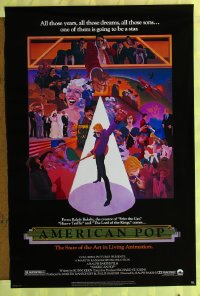Ralph Bakshi (born October 29, 1938, in Haifa, Palestine [now Israel]) is an American director of animated and occasionally live-action films. As the American animation industry fell into decline during the 1960s and 1970s, Bakshi tried to bring change to the industry and pioneered adult animation using political commentary and satire.
Bakshi started his career as a cel polisher at the Terrytoons studio, working his way up from cel painter to inker, then animator, and eventually began to direct animated television shows for the studio. Bakshi moved to Famous Studios in 1967, before starting his own studio in 1968. Through developing a work relationship with producer Steve Krantz, Bakshi made his debut feature film, Fritz the Cat in 1972, the first animated film to receive an X rating from the Motion Picture Association of America. The film was followed by Heavy Traffic and Coonskin. All three films were extremely controversial for their content and approach to animation.
In the late 1970s and early 1980s, Bakshi became a spokesperson for a new direction in animation with American Pop and the fantasy films Wizards; Fire and Ice, with legendary painter Frank Frazetta; and the first film adaptation of J. R. R. Tolkien's The Lord of the Rings, a film that laid the groundwork for future adaptations of the book. In the mid-1980s, Bakshi returned to his roots in TV cartoons with a revival of the Mighty Mouse character, and the animated specials Christmas in Tattertown and The Butter Battle Book, based on the book by Dr. Seuss.
Following the troubled production history of Bakshi's 1992 feature film Cool World, he did not complete another animated feature film. Bakshi's films have created controversy while continuously breaking new ground in the form. He encouraged the public to look at animation in a new way by creating worlds that are sometimes familiar and sometimes alien, whose power and strangeness are completely absorbing.
Life and career
Ralph Bakshi was born of Krymchak descent on October 29, 1938, in Haifa, then part of the British Mandate of Palestine. In 1939, his family went to New York to escape World War II. and produced several experimental animated short cartoons, although none of them had a major impact with audiences. Paramount closed its cartoon studio for good in 1967. In 1968, Bakshi founded his own studio, Ralph's Spot, and headed a low-budget but distinctive animated series for television based on the Spider-Man comic book; new episodes appeared until 1970. After 1970, Bakshi left the world of television and went into full-length animated feature films.
Early days
In 1971, Steve Krantz tagged on as a producer on what was to be Bakshi's first feature film. They mulled over various projects, finally deciding on Robert Crumb's successful underground comic book Fritz the Cat. Bakshi was initially reluctant to direct the film because he had spent years working on animated productions featuring animal characters and wanted to make films focusing on human characters.
Fritz the Cat, Heavy Traffic and Coonskin
Bakshi turned away from race and cultural issues and began producing fantasy films. His first was Wizards in 1976. Bakshi ran into trouble when he was unable to complete the battle sequences with the budget 20th Century Fox had given him, and the studio refused to raise his funds.
Unfinished projects
Bakshi returned to street-smart movies in the early-1980s, but Hollywood had, for the most part, turned its back on animation at the time and Bakshi worked behind the scenes for most of the decade. American Pop and Hey, Good Lookin', came next, followed by Fire and Ice, with famed fantasy illustrator Frank Frazetta. In the mid-1980s, he returned to his roots in TV cartoons. His biggest success in the 1980s was a TV cartoon series aired in 1987, Mighty Mouse: The New Adventures. The series ran for two years. Complaints from television watchdog groups about perceived drug references were a driving force in its cancellation.
Later work
Bakshi has encountered much controversy and criticism during the span of his career. When it was first released, Fritz the Cat was criticized by some for its style and subject matter. Top animators of the era took a full page ad out in Variety telling Bakshi to "take [his] garbage back east.") added to this belief.
 Controversy and criticism
Controversy and criticismBakshi's reputation as a spokesman for the medium has led to his being caricatured in various animated projects, usually as an obese, slovenly figure. Noted fans of Bakshi's include directors Quentin Tarantino and Spike Lee, On the audio commentary for the DVD release of The Fellowship of the Ring, Jackson acknowledges one shot, a low angle of a hobbit at Bilbo's birthday party shouting "Proudfeet!", as an intentional homage to Bakshi's film.
Influence
From 1972 until 1994, Ralph Bakshi directed nine feature films, writing five of them. He made voice cameos in six of his animated features, and in episodes of Spicy City and Ren & Stimpy "Adult Party Cartoon". He also directed an animation sequence featured in the 1984 live-action film Cannonball Run II, and was interviewed for the 2003 documentary feature Frazetta: Painting with Fire, and the segment Ralph Bakshi: The Wizard of Animation, which appears as a special feature on the 2004 DVD release of Wizards.
Films
Mighty Mouse: The New Adventures (TV series) (1987) (also writer)
Christmas in Tattertown (TV special) (1988) (also writer)
This Ain't Bebop (live action) (1989) (also writer)
Hound Town (1989) (TV)
Dr. Seuss' The Butter Battle Book (1989) (TV special)
Cool and the Crazy (TV movie, live action) (1994) (also writer)
Malcom and Melvin (1997) (also writer)
Babe, He Calls Me (1997) (also writer)
Spicy City (TV series) (1997)
No comments:
Post a Comment